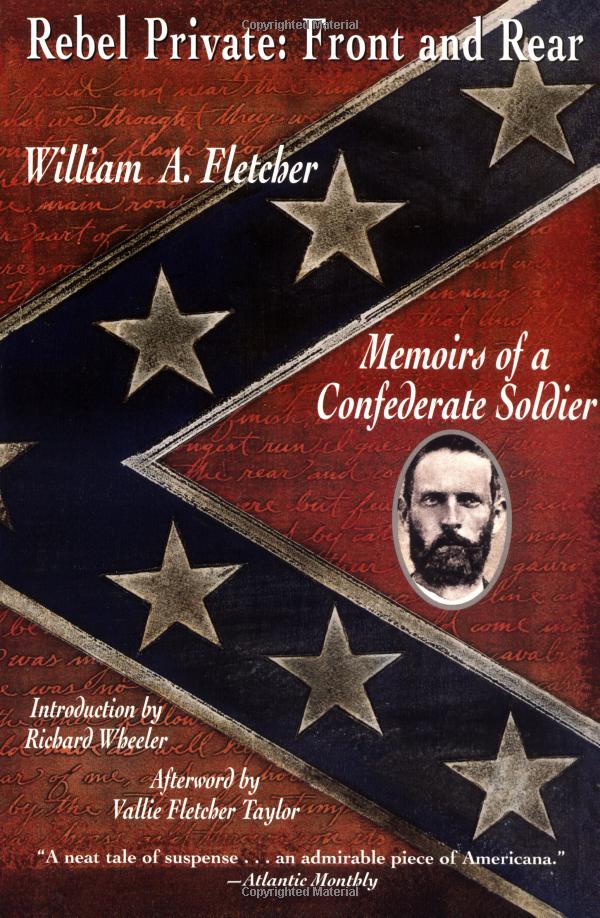Rebel Private: Front and Rear
Memoirs of a Confederate Soldier

Gone With the Wind author, Margaret Mitchell, described it as her single most valuable source of research.
This is a most informative book on the civil war. Written by a soldier, it is a well-written look into his experiences. It is notable for its recording of the events without prejudice or malice by a participant and witness. William "Bill" Fletcher exhibits great skill both of observation and of being able to communicate what he witnessed.
It is an interesting yet easy read – even your kids can enjoy it. I recommend it highly. (ed)
It can be purchased at Amazon: Rebel Private: Front and Rear: Memoirs of a Confederate Soldier, by William A. Fletcher (1839-1915) ISBN 0-452-01157-4
About William Fletcher
William Andrew "W.A." Fletcher was a grand-uncle by marriage of Olga Keith who married Harry Carothers Wiess. He was born in 1839 in St. Landry Parish, Louisiana, the son of Thomas Fletcher, who was born February 18, 1807 in Greenville county, North Carolina and Eliza Miller who was born April 9, 1815 near Murfreesboro, Tennessee. Eliza died and Thomas Fletcher remarried Margaret Mouchet of St. Landry Parish in 1849. Thomas and Margaret had three children -- half-siblings to Bill Fletcher. They were Henry, Beatrice Vandalia and Alzenia Fletcher.
His father moved from Louisiana due to concerns about slavery and what he thought were impending problems because of it. He moved his family to Wiess' Bluff in Texas in June of 1856.
Fletcher joined the Confederate Army in 1861, serving with the Army of Northern Virginia's elite Texas Brigade. He was wounded at the second battle of Manassas and again at the Battle of Chickamauga. Unable to march because of his wounds, he transferred to the cavalry and finished the war with the Texas Rangers.
He wrote of his experiences in his book Rebel Private, Front and Rear, published by the Greer Press at Beaumont in 1908 but much of it was burned in 1924. The book was reprinted by the University of Texas Press in 1955. The current edition presents unvarnished images of hard marches, short rations and battles in which being wounded could prove worse than being killed. Fletcher describes the horrors of being a Civil War casualty as vividly as any firsthand account from either side. The author emerges from these pages as fighting less for a cause than for his own pride in being a good soldier. His narrative does more than many learned monographs to explain the Confederacy's long endurance against overwhelming odds.
In 1866 he married Julia Ann Long, the daughter of Davis L. Long and Eliza Miller. Davis Long's great granddaughter, Olga Keith, married Harry Carothers Wiess, a grandson of Simon Wiess.
He served on the first board of the Gulf, Beaumont and Great Northern Railroad (chartered 1898) with Nathaniel D. Silsbee of Boston, James Irvine of New York city; John H. Kirby of Houston; and fellow Jefferson county residents William Wiess, Mark Wiess, W. S. Davidson, William W. Wilson, and W. C. Averill.
Fletcher's comments about Simon Wiess
W.A. Fletcher writes on page 3:
"At Wiess Bluff, father found in old man Simon Wiess a well read and intelligent man, and one who reasoned the future as he did; but his moving ideas were somewhat different, as I have heard him remark to father that if he could sell out at not too great a loss he would move to the Republic of Mexico in order to keep his boys out of war. While at Wiess Bluff, about the only mention of war I would hear was by father and Wiess."